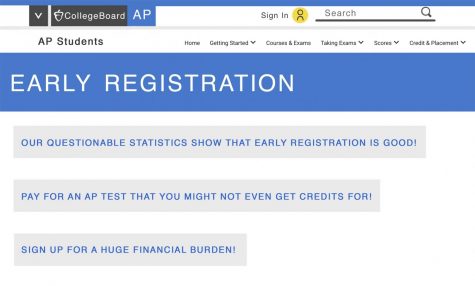Early AP registration deserves a one
October 7, 2019

Revolutionary, groundbreaking, and innovative—these are just a few of the words many are using to describe The College Board’s decision to move the Advanced Placement (AP) test registration deadline from March to November.
Just kidding—virtually everybody except The College Board is against earlier registration deadlines.
As a senior, this new change is especially infuriating. Since I don’t foresee myself getting recruited to Princeton for badminton anytime soon, I won’t know what college I will be attending by November, and I won’t know which AP credits my college will accept. And with a price tag of $94 each, AP tests are expensive. This year, I’ll definitely spend a couple hundred dollars and at least 8 hours of testing for AP credits that my future college may not even accept, and so will many other seniors.
I’m grateful that my family can afford to spend $94 on a test, so this change is just an annoyance to me. But the new deadline places a huge financial and mental burden on lower-income students. Financially challenged students may not be able to drop hundreds of dollars for AP tests and will need to prioritize which AP tests to take to get a passing score. This new deadline forces them to decide whether to spend a huge sum of money on a subject they’ve only studied for two months.
The College Board’s decision to move the registration date is clearly immoral. They are taking advantage of students, specifically lower-income students, who need time to decide which AP tests to take. Every AP student is getting cheated by early registration. But what is The College Board’s justification for implementing these new changes?
On their website, The College Board lists how they came up with these changes in a YouTube video that boasts a four to one dislike-to-like ratio. They explain that their fall registration was “inspired” by schools because “more than half of all AP schools offer some form of fall registration.” They tested these changes in nearly 1,000 schools, and saw that schools that implemented fall registration see higher motivation, higher participation and better scores. In the 2017-2018 school year—the only year they have statistics from—the number of 3’s from students in the pilot program increased, with the passing rate of low-income students increasing by 20%.
However, many people aren’t convinced, including me. The inspiration shtick seems forced—while some schools may have offered fall registration, there was no demand or need for The College Board to implement it for everyone. And while the improvements they cite are amazing, they are also deceiving. The College Board only touts statistics that make them look good, but by looking at their data provided and the last two years of AP exam data, you can find the flaw in The College Board’s reasoning. Yes, more low-income students took the tests, and yes, more low-income students passed their AP tests. However, the percentage of low-income students that passed decreased, from a 60.3% fail rate in 2017 to 64.3% in 2018. As a student taking AP Statistics, I know that this is a significant increase that indicates a causal relationship between earlier deadlines and more failures (thanks College Board!)
This misleading data shows that earlier deadlines are just another way for The College Board to extort even more money from test takers and generate more revenue—even more than the $1 billion it makes annually. The previous March deadline gave students enough time to determine if taking the AP test was worth it. Students can’t know how confident they are in the material by November, which will lead to an increase in the number of students registering, but a decrease in the passing rate. And of course, even more money in The College Board’s pocket.
While The College Board claims that earlier deadlines help students, it’s clear that their main motivation in pushing out earlier deadlines is money. The College Board should revert back to spring registration so high schoolers don’t have to waste any more money taking yet another one of their tests.




